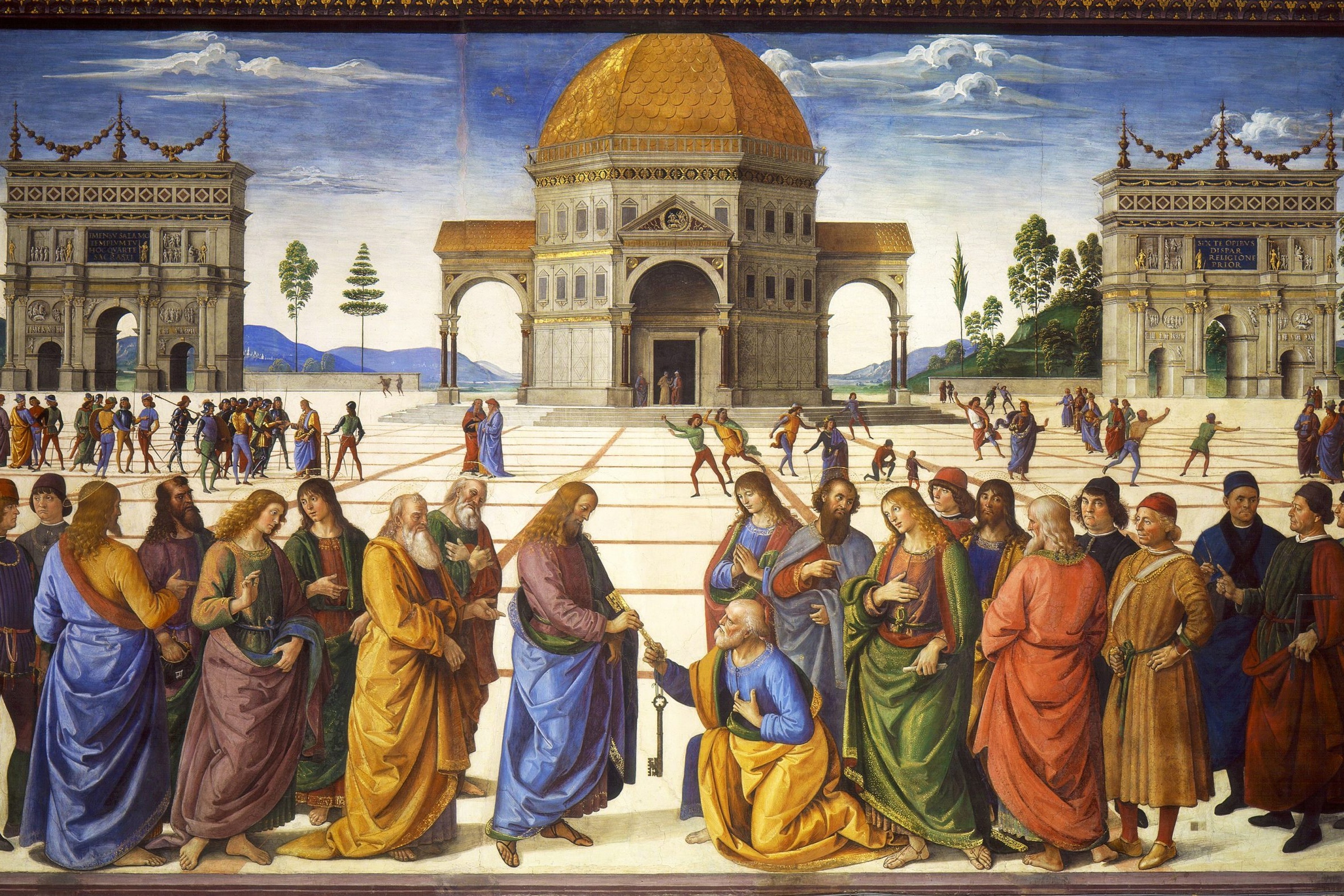It is profoundly difficult to get outside one’s culture and history, yet this is the beginning point for true contemplation and spiritual freedom. Paul writes in Romans 12: 2:
Therefore, I urge you, brothers and sisters, in view of God’s mercy, to offer your bodies as a living sacrifice, holy and pleasing to God—this is your true and proper worship. 2 Do not conform to the pattern of this world, but be transformed by the renewing of your mind. Then you will be able to test and approve what God’s will is—his good, pleasing and perfect will.
Furthermore, he rejoices that “I have been crucified with Christ and I no longer live, but Christ lives in me. The life I now live in the body, I live by faith in the Son of God, who loved me and gave himself for me.” (Galatians 2: 20). As a white, educated, American man, conditioned by genetics, family, culture and history, and profoundly influenced in unconscious ways by myriad experiences and traditions transmitted through the great arc of Western civilization, I realize I’m both privileged and blinded on so many counts. From my own experience, I know I need a contemplative practice to escape my “old” self and free myself of the distractions, delusions and comforts of my ego, culture and history. Some form of solitude and spiritual practice, of deep prayer and communion with God, is necessary to remember and recreate my innermost spiritual being and consciousness. This is where deep and lasting transformation occurs. From this place of contemplation and inner peace, I am able to understand more clearly what is mine to do and have the courage, compassion and creativity to do it.

Immediately after receiving the glorious baptism as Son of God from the Father and the Holy Spirit through John the Baptist, Jesus is led by the Holy Spirit into the wilderness to encounter the Devil. It is not until after he fasts for forty days and nights and is hungry when the devil first approaches him. Presumably, Jesus is in this weakened state so to intensify beyond all conceivable resistance the nature of the temptations the Devil presents, the first being bread. Jesus identifies so extremely with the weakness of human nature, draws into the bewilderment and enslavement to our desires and appetites that is the human predicament, so that he faces the full power, terror and temptation of these tests. Certainly, his triumph over the Devil’s temptations gives us great strength and encouragement that we too can triumph over the temptations in our life by following Jesus. This is an enduring truth of this Scripture.
But I wonder if going into the wilderness right after his revelation as the Son of God and before he begins his public ministry is also to demonstrate how we must strip ourselves of any possible vestige of egoism, culture or history to be at our full strength and holiness in encountering temptation. Jesus demonstrates an intense and agonizing spiritual retreat of forty days and nights to strip himself of every shred of his Jewish culture and history, every trace of his particular secular tribal identity, to invite us to do the same. Instead of this wilderness experience revealing a weakened state, I believe it reveals Jesus at his most divine state of being and consciousness, emptied of his humanity. Immediately following the apotheosis of his membership in the Holy Trinity in baptism, Jesus endures a purging and cleansing of his human and cultural identity so that he will have the divine strength, endurance and wisdom to resist the devil in his most cunning and powerful form. Jesus invites us to search deeply within for the remaining weeds of egoism and secular culture that lead us away from the spiritual kingdom of heaven, lead us away from being in Christ. If we surrender to these being pruned away, root and branch, nothing is impossible for us through God’s grace and our faith.
Throughout human history, going back to its most primitive beginnings, the delusions and distractions of tribalism, just like those of egoism, have been and are still deeply embedded in every human being as essential for our survival, and even for our flourishing as a people and individuals. This is the very paradox of the believer. We need to confront what is good in the cultural and individual identity of the old self, and then transcend it to fully embrace our new creation and divine identity in the spiritual body of Christ. The very liberation and transformational quality of finding new being and consciousness through faith is premised on the very fact of how deeply influenced we are by received culture and tradition, the unconscious conditioning since infancy from family, community, and the other institutions of our surrounding society. Antonio Gramsci, the Italian “cultural” Marxist (he wrote on political theory, sociology and linguistics), developed the concept of “cultural hegemony” wherein the structures of power and domination operate through the very consent of the governed on the terrain of cultural values and beliefs. The dominant culture that circumscribes individual freedom and collective action and supports the existing power structure and institutions is “thoroughly saturating,” going to the depth and bredth of our being and consciousness. This is especially true in a democracy and of a free people, and our very challenge to see. For me this recalls Paul’s warning above not to conform to the patterns of the world but to free yourself from the false delusions and distractions of secular culture. These tragically and ironically saturate the church and religion, as the great violence and barbarism done in the name of God far too overwhelmingly confirms. It also works on a personal level, and yet this is also where we have our greatest opportunity to triumph over it, and rejoice in authentic and intimate communion with God.
And so true spiritual self-discovery and liberation begins with a very searching and honest inward inquiry, and at times painful peeling away of the comforts and delusions of culture and history. It begins in the wilderness of being alone in God’s creation, to discover anew the beauty and goodness of the incarnation of the divine in nature, in all human beings, and in your true holy self. This is then what gives you the strength and compassion and courage that Jesus demonstrated to face the Devil fully. This gives the amazing freedom that comes from being released from the Devil within, which is the ego’s own will to power, pleasure and meaning. The sheer power of this human will is at once a primitive and necessary impulse for survival in early human evolution, but it then refuses to let go in our ongoing evolution to greater spiritual being and consciousness, to our ever greater capacity to surrender to God’s will and purpose.
Jesus goes into the wilderness to become totally self-reliant, the new Adam. We too can follow and become the new Christ, reliant not on our material and temporal egoistic self, the self that is conditioned by family, culture and history. But on our spiritual self that Richard Rohr calls an “immortal diamond.” This is the self that is created and loved and sustained by God. This is the kind of transcendental individualism that Ralph Waldo Emerson envisioned as possible in the new America in his great essay on “Self-Reliance.”
Who so would be a man must be a nonconformist. He who would gather immortal palms must not be hindered by the name of goodness, but must explore if it be goodness. Nothing is at last sacred but the integrity of your own mind. Absolve you to yourself, and you shall have the suffrage of the world.
Emerson’s paean to individualism in the New America was not the small-minded and tawdry selfishness and profit-seeking of free market “capitalist” competition. This is actually how the idea of capitalism developed in the specific history of America in the 1800s, a particular form that developed into an enduring cultural hegemony in the full blast of rapid settlement through privatization of public lands and of public works (e.g. the railroads) of the west following the Civil War and the stark, raw and unrestrained industrialization at the end of the century. All of this created vast inequalities and injustices. Fortunately, the genius of American democracy allows for many counter and alternative currents to ever bring Emerson’s alternative vision of individualism to greater fruition. There are many dissident and nonconforming voices and movements in the great multitude of followers and seekers, before and since his age. And just so, Christianity as practiced as authentic faith can also be a compelling and joyous alternative narrative to the dominant culture of secular society and the institutional church. Christian faith can also live like the Franciscan Order as a flourishing alternative way of peace and reconciliation that is given space within the established order of the Catholic Church.
Along with Emerson, Walt Whitman envisioned “spiritual democracy” as the kind of polity and community that truly free and equal citizens can create together. Indeed, theirs was one of the rare great awakening of consciousness that springs forward in various times and places in history. This was also the mind and sensibility of Thomas Jefferson and Adam Smith. It is no coincidence that Jefferson’s Declaration of Independence and Smith’s Wealth of Nations were both published in 1776. For this age was the unprecedented emergence of the ongoing revolutions of democracy and capitalism, each mutually-reinforcing toward widening circles of greater freedom, equality, wealth and community. (See for example, Thomas Haskell’s Capitalism and the Origins of the Humanitarian Sensibility, in which capitalist values of individual dignity, social trust, and creative work informed the Abolitionist movement.) Both of these founders of democracy and capitalism, respectively, would be greatly disappointed in the turn of history away from Emerson’s and Whitman’s vision of individualism and toward the thoroughly secular and small-hearted and narrow-minded ideology of self-centered, profit-seeking “possessive individualism” (C.B. McPherson). This more humane sensibility informed their vision and hope for the new polity and economy of the new nation. Each influenced by the “moral sense” school of the Scottish Enlightenment, they simply understood that trust in individual freedom, and supported by education, would bring forth a much richer, authentic and robust commonwealth; they trusted that all the educated and creative individuals would “naturally” seek the common good.
Right individualism or, as Alexis De Tocqueville called it, self-interest rightly understood, was what they assumed would be unleashed in the new freedom from the corrupt, abusive and stagnant mercantilist world of Europe spreading across the Americas. Jefferson and Smith were actually horrified by the selfish egoism of that corrupt world, and looked to a democratic and free people for a new birth of virtue, social trust, creativity, fair and just judgment, and empathy. Instead the market unleashed the savage egoism and materialism of “the war of all against all” as envisioned by the Tory, Thomas Hobbes. His use of the construct, “state of nature,” referred to any kind of society outside the social contract. He used it to defend the underlying order of the aristocratic society of England, as the only such example of a society based on a social contract. It was indeed a heavenly society extending back in philosophic and religious justification to the sixteenth century Elizabethan “chain of being,” where all things and creatures were arranged in an anointed divine hierarchy of ranks and degrees, linked together in reciprocal rights and responsibilities, with the greater privileges and powers highest at the top and descending downward to the obscure masses safely anchored in peaceable villages and towns. How ironic that we now have a polity and economy far more closely resembling a “state of nature!” We have an often ruthless political and economic life that is still far too much influenced by the social Darwinism of the late nineteenth century and its sad ethos that through natural selection only the best and the brightest are intended to survive and flourish. The rest of us are, as Jefferson most vehemently protested we were not on the occassion of the fiftieth anniversary of the Declaration, “born with saddles on our backs,” for the “favored few booted and spurred, ready to ride them legitimately, by the grace of God.”
O Lord, I pray to be immersed in the beauty, harmony and purity of your wilderness. Please cleanse me of the unconscious patterns and enslavements of egoism, culture and history. I rejoice that through you, “I live no longer, not “I” but it is Christ living in me.”
John Henry Twachtmann, American Artist, “Winter Harmony” circa 1890



